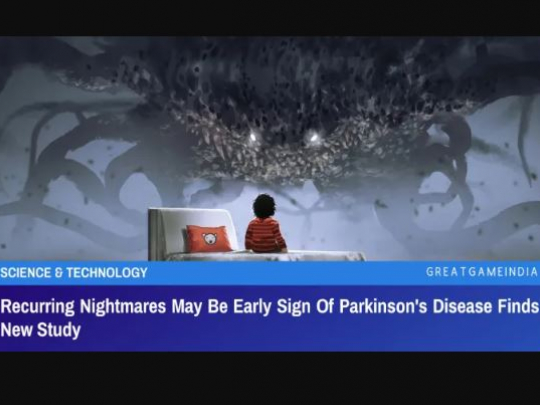Recurring Nightmares May Be Early Sign Of Parkinson’s Disease Finds New Study

Dreams can offer important information about our brain anatomy and function, rendering them an appealing topic for neuroscience research. A new study has found that recurring nightmares might be an early sign of Parkinson’s disease.
As per latest research among older males, the introduction of nightmares later in life may be an early indicator of Parkinson’s disease development.
The researchers, released in the journal EClinicalMedicine (read below), evaluated the health of 3,818 older men with normal brain function for 12 years and concluded that those who had recurrent nightmares were twice as probable to acquire Parkinson’s disease. The bulk of diagnoses were made within the study’s first five years.
The findings imply that elderly people could be tested for Parkinson’s disease by asking them about their dreams. According to the researchers, early interventions could assist to prevent the formation of physical symptoms including tremors, stiffness, and slowness.
One of the most challenging parts of Parkinson’s disease is early identification. By the time most people recognize they have the condition, they have lost 60 to 80 percent of their dopamine-releasing neurons in areas of their brain stem. Additionally, as shown in an earlier study by the same researcher, Abidemi Otaiku, those who have disturbing nightmares are five times more prone to have accelerated illness advancement.
“Although it can be really beneficial to diagnose Parkinson’s disease early, there are very few risk indicators and many of these require expensive hospital tests or are very common and non-specific, such as diabetes,” neurologist Abidemi Otaiku from the University of Birmingham in the UK said, per a EurekAlert news release. “While we need to carry out further research in this area, identifying the significance of bad dreams and nightmares could indicate that individuals who experience changes to their dreams in older age – without any obvious trigger – should seek medical advice.”
The study aims to help explain the difference between Parkinson’s adverse effects and prodromal, a phrase researchers use to characterize minor symptoms that occur before serious problems manifest, by studying a large group of elderly men for more than a decade.
Those who self-reported experiencing frequent distressing dreams were twice as probable to acquire Parkinson’s disease during the course of the survey. Additionally, throughout the first four years of the trial, having regular unpleasant dreams was connected to a six-fold increase in the likelihood of developing the neurological disorder.
For many years, scientists have been investigating the relationship between sleep and Parkinson’s disease. A quarter of Parkinson’s patients have recurrent intense nightmares from the moment they are diagnosed, and others have had frightening dreams for up to ten years before being identified.
Previous research has found that patients with Parkinson’s disease are four times more likely than average to experience frequent nightmares. Rapid eye movement sleep disorders, which cause dreams to be physically recreated during the night, are more prevalent in Parkinson’s patients.
Without more research detecting brain activity during sleep, the researcher believes it will be difficult to determine what is happening on at a biological level in Parkinson’s patients who have nightmares.
Men with Parkinson’s disease reported more disturbing dreams than women, but the explanation for this is uncertain. According to one hypothesis, the late emergence of nightmares in certain males is an early indication of neurodegeneration. Women are significantly more likely than men to have frequent nightmares early in life, but men start to catch up around the age of 65.
The results also show that our dreams can offer important information about our brain anatomy and function, rendering them an appealing topic for neuroscience research. The researchers will utilize electroencephalography (EEG) to explore the biological reasons of dream alterations. They will also look at whether the results can be reproduced in larger, more diverse groups, as well as potential connections between dreams and other neurodegenerative conditions such as Alzheimer’s.
- Source : GreatGameIndia


















